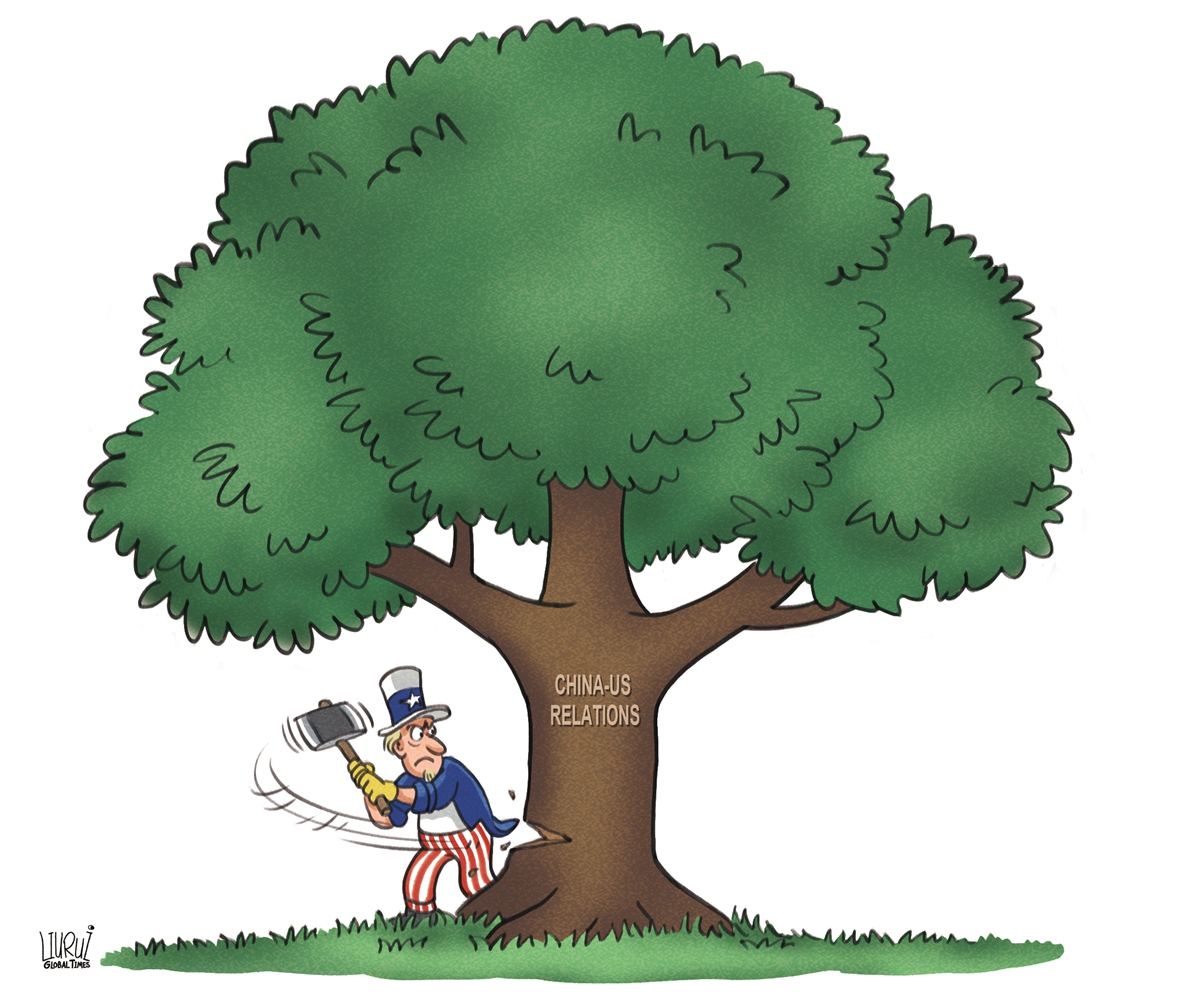Who should be blamed for deteriorating US-China ties?
By William Jones Source: Global Times Published: 2020/8/18 17:38:41

Illustration: Liu Rui/GT
It's perhaps understandable that some people may try to do self-examination of China policy at a point when US-China relations have slid to an unexpected low. But it is hard to see that China could have done anything differently to change the situation short of reneging on some of its most essential goals in the process of China's emergence as a major power on the world stage. In fact, compared to all the other countries in the world, China did everything right.
As a result, it has come out on top in many fields, including 5G, AI, and quantum communications. While the 2008 financial crisis still plagues Western countries, China's introduction of the Belt and Road Initiative (BRI) provided a way out of poverty for many developing countries that were recipients of its assistance. It even served to help revive the economies of the West through the increased East-West trade which it made possible.
So why is the animus toward China coming out of the US institutions these days and putting the world on the path to possible war? There are two major reasons for this.
First, China, with its 1.4 billion people, cannot help but become a major power in shaping world history as it grows into a fully developed country. But determining the course of world history is viewed by some Western geopolitical circles as being a prerogative of Western elites, in particular Anglo-American elites. This is partly a result of the tradition of the British Empire, "on which the sun never set."
While the US was traditionally an anti-imperial nation, our British friends have spent a lot of efforts through the postwar period in getting the American political elites to adopt the view of an "imperial" power, creating this fictitious "special relationship," in particular after the death of anti-imperial Franklin Roosevelt.
Second, the deterioration was caused by the failure of the US to follow its own successful tradition of using science and technology as a driver for the US economy. Over the last 40 years, the US has been transformed from a strong industrial economy to a renter economy.
From the 1970s on, US industry was motivated increasingly by "shareholder value," rather than real physical profits. The US dismantled its industrial base and shipped it to low-cost countries, initially to Mexico and Asia, including China. And the international role of the dollar allowed the US to disregard the deterioration of its own infrastructure, and to focus solely on the stock market, namely, on "shareholder value." Industrial leaders were replaced by financial gurus, and as long as the stock market was up, everything looked good - until it didn't.
The success of Huawei in 5G development and China's putting a rover on the far side of the moon was a real eye-opener. The US could have reacted differently and developed a competent industrial policy to build up the country's capabilities. The idea arose that no country not under the control of the ruling Anglo-American elites would have an independent voice in the direction the world would take. And therefore, China, the Communist Party and the BRI had to be stopped by Washington at whatever cost.
This, and nothing else, is why US-China relations are in such a sorry state. And what is to be done to resolve it? It will largely depend on developments over the coming months leading into - and following - the November presidential elections.
While "China bashing" will no doubt be the leitmotif of the election debates, there are US political elites who are very concerned with the deterioration of the relationship and may make their voice heard in reducing the tension.
It's also unclear how much "leash" President Donald Trump, who may still want a good relationship with China, will give to his "attack dog" Mike Pompeo. And it will also depend on how successful Pompeo is in bringing other nations on board his "new alliance of democracies."
Not all countries are terribly anxious to follow the lead of the US in a policy that could lead to World War III - including many countries that are in principle allied with the US.
For China, this will require vigilance, but also strategic patience.
The author is a Washington-based political analyst and a non-resident fellow of the Chongyang Institute for Financial Studies. opinion@globaltimes.com.cn
RELATED ARTICLES:
Posted in: VIEWPOINT